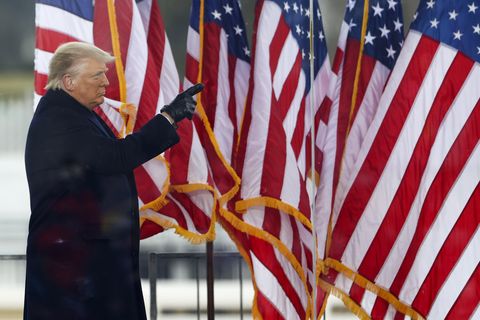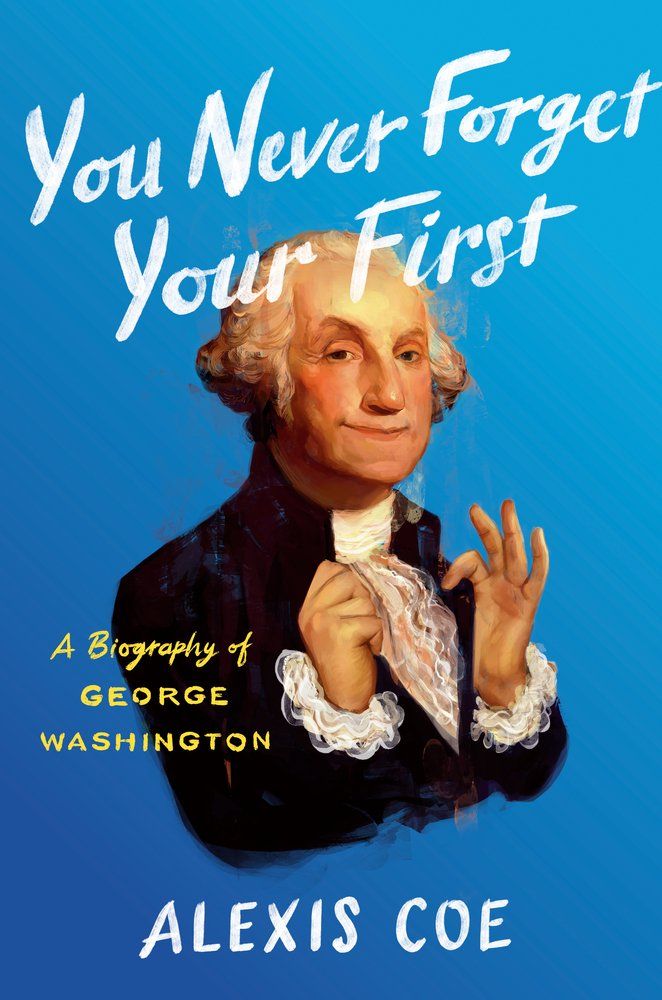Precedent That George Washington Set
Since 2016, I have received the same question from journalists and news anchors, friends and family, over and over over again: Is at that place a precedent for this? I can't recollect a fourth dimension that I, a presidential historian, answered, "aye," merely I can call up feeling equally if there was never enough time or hunger for more than a audio bite and suggested reading. But yesterday, as nosotros watched a sitting president incite violence in the nation's capital, I was overwhelmed by how little people seemed to empathise that we were watching more than the decision of a 233-year tradition.
The peaceful transfer of power isn't some ritual. It defined united states of america as a country, and while America sparked an age of revolution, it emerged as the only comparatively stable democracy. The French executed their monarch, devolved into violence, and a decade later, installed an emperor. We, on the other mitt, were led by George Washington, the human who wanted, after the war was won, anything but power.
"Next to Washington, they all look modest," a fictionalized King George Three sang in Hamilton—a sentiment that was shared by the real life monarchs, despots, and military dictators of the 18th century. "They wanted me to be another Washington," Napoleon Bonaparte complained on his deathbed, after being dethroned twice. From the moment the Annunciation of Independence was appear, George Washington, a 44-year-old Virginian, made them all look bad.
More From Town & Country

Appointed General of the largely inexperienced, ill-equipped Continental Ground forces and tasked with defeating i of the greatest armed forces powers in the world, Washington stuffed himself into a compatible he'd last worn at 27 when he retired from the Virginia militia, bought a couple of books on battlefield strategy and, with a lot of assistance from the French in the concluding hour, did the unthinkable. Equally Benjamin Franklin famously said to the British, Washington "sent home to yous, one afterward another, five of your best generals, baffled, their Heads bare of Laurels, disgraced even in the opinion of his employers." And the globe.
Washington waged 2 wars during the Revolution: Ane with arms, and i with public opinion. By insisting that the Continental Army follow the rules of war when the British refused to do the same (they argued it was a rebellion, not a revolution) Washington showed the world that America was born a stable nation, based on a fix of principles, and prepare to claim its place in the globe.
Victory at Yorktown won the war, but what Washington did next secured the difficult-won independence. History was full of cautionary tales in which military commanders, from Julius Caesar to Oliver Cromwell, seized political ability during revolution, transition, and instability. But Washington made it very clear to Congress that he wanted to transfer power as soon as possible. "It is essential for me to know their pleasance, and in what manner will be most proper to offer my resignation," Washington badgered Thomas Mifflin, president of the Continental Congress, offering to write a letter of the alphabet or perform a public display or anything they wanted that would testify to be undeniable evidence that America was a commonwealth.
Equally Christmas neared, Congress sent Washington careful stage directions, which he followed to the letter on Dec 23, 1783, in deference to the men who would now atomic number 82 the nation. (The scene was famously immortalized in a painting by John Trumbull, which was visible in the background of photos of insurrectionists storming the capital building yesterday.) "If he does that," Rex George Three reportedly said in disbelief of Washington's resigning of his commission, "he will be the greatest man in the world."
That's exactly how Washington wanted to exist remembered, "having happily assisted in bringing the send to port," he wrote to John Jay in 1786. Sure, he was distressed at news taxes went uncollected and foreign debts unpaid because the Due north and South couldn't agree on the powers of a central authorities. "From the high footing on which nosotros stood," he lamented, "from the patently path which invited our footsteps, to be so fallen!"
But he didn't budge. Washington intended to remain at Mountain Vernon, where he lived with his family unit and the hundreds of people they enslaved, for the residuum of his life. He'd slept in 280 beds during the state of war, and he hoped his ain would exist the terminal. "It is not my business to commence again on a sea of troubles," he insisted. The America they fought for was supposed to be greater than 1 man, and its survival depended on it.
Washington is often described as the father of the nation, but over time, I've come to retrieve of him more equally its mother. He'd carried America to term, merely he needed to stick around until, at the very to the lowest degree, it was eating solid foods. The delegates of the Constitutional Convention thought so, and spent months imploring him to bring together them; upon arrival, they unanimously elected him to exist the convention'southward president, confident they could work together under his leadership. He obliged, settling into a wooden chair on an elevated platform as the men debated issues, only speaking up when delegates became too heated, and even so, he needed to do footling more than remind them of his presence. When it came fourth dimension to sign the Constitution, he was start in line, and likely the kickoff to head domicile.
Not so fast, the founders said. By showing up, Alexander Hamilton argued, Washington "pledged to take office in the execution of the government." They'd agreed on i executive versus 3, and not much else about the presidency, considering they assumed they were looking at the man who would fill the office, and could be trusted to figure it out along the manner. Surely he'd aid steady the authorities as information technology learned to walk. At 56, it was the terminal thing Washington, and most certainly his wife, wanted, yet it seemed as if the choice was not truly theirs to make. Washington called the presidency "the place of his execution." The state might benefit, but he had everything to lose.
The next eight years proved him right. By his second term, Washington had avoided international conflicts, created the cabinet, oversaw the establishment of a central bank, and gear up other precedents futurity leaders would follow, with few exceptions, only he also fabricated a series of blunders. He was no longer immune to criticism, and estranged from almost of the founders, including Thomas Jefferson and James Madison, which convinced him the land no longer needed his service.
The Constitution had not express the number of terms he could serve, but rather delimited the terms to four years, and Washington, having now raised the state to the historic period of eight, announced he would not seek reelection. For the 2d fourth dimension, the world waited for confirmation that Washington had done the unthinkable, and America, in practice, non theory, was truly a democratic country. And they got it—then and in the years to come.
Until yesterday, Washington'southward example of a peaceful transfer of power had been followed by 44 presidents. Maybe an amendment is needed, as it was for term limits later FDR, merely one thing is certain: This is non George Washington's America. So whose is it?
Alexis Coe is an historian and the bestselling author of You Never Forget Your First, a biography of George Washington.
Precedent That George Washington Set,
Source: https://www.townandcountrymag.com/society/politics/a35154049/peaceful-transition-of-power-history-george-washington/
Posted by: tyrephost1941.blogspot.com






0 Response to "Precedent That George Washington Set"
Post a Comment